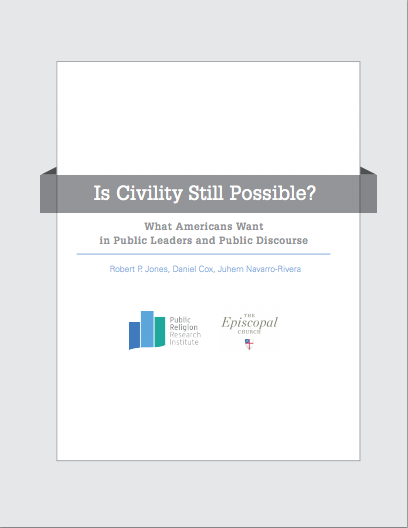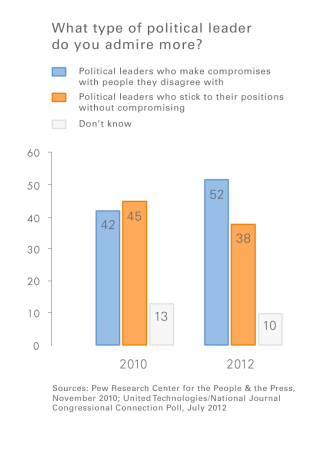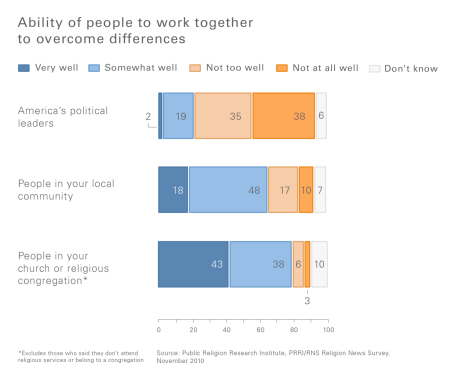Beginning as early as the Adams-Jefferson contest of 1800, the American public has expressed concern over the negative tone of political campaigns. These days, Americans are bombarded by political smear campaigns in the form of print ads, television commercials, lengthy op-eds, and even social media messages. Higher levels of partisan polarization and economic inequality, plus massive changes in the ethnic, racial, and religious composition of the country only further elevate the tumult. With all this division among the American public, is it even possible to have a civil conversation?
The report “Is Civility Possible?” analyzes data from over 20 surveys to see how Americans feel about civility in American politics and public discourse. Public Religion Research Institute (PRRI), in partnership with The Episcopal Church, examines how polarized the American public really is, what Americans want from elected officials, and where the sources of incivility lie.
Throughout PRRI’s research, we discovered one thing about which Americans stand united: concern over the perceived lack of civil and respectful discourse in the political system. More than 8-in-10 Americans say this is a somewhat serious (32 percent) or very serious (49 percent) concern.
To amend this incivility, Americans want their elected leaders to compromise. The number of Americans who admire political leaders who make compromises jumped 10 percentage points, from 42 percent in 2010 to 52 percent in 2012.
But this compromise might be hard to effect, as the American public doesn’t hold high regard for politicians’ ability to work together to overcome differences. Only about 1-in-5 Americans think America’s political leaders work very well (2 percent) or somewhat well (19 percent) together. Compare this to how the public thinks people in their religious congregations work together: 43 percent say very well and 38 percent say somewhat well.
The path toward greater civility and respect in public discourse is somewhat complicated due to our collective tendency to associate with people whose views, values and experiences we share. Despite growing diversity, Americans continue to associate, socialize, and congregate largely with people who share the same background. Religious institutions, which in many ways are suited to foster dialogue, are also hampered in their efforts because congregations continue to be segregated along racial and even ideological lines. Religious bodies must also navigate the declining levels of trust in civic institutions, particularly among young adults. When religious leaders focus on divisive issues, Americans are more likely to perceive the leadership as part of the problem rather than as a potential solution.
The 21st century media landscape is also creating challenges for civil discourse. More and more, our country’s polarized media outlets reward extreme rhetoric, with political discussion that often aims to create conflict and drama at the expense of moderation. On the digital side, incivility in online discussion forums is quite common and is usually not limited to just a few commenters.
Despite these divisions and barriers, Americans remain deeply concerned about the rising levels of incivility in American politics and elections. The overwhelming majority of the public believes that the lack of civil discourse is a major problem for the functioning of our political system.
Read the entire report here.







